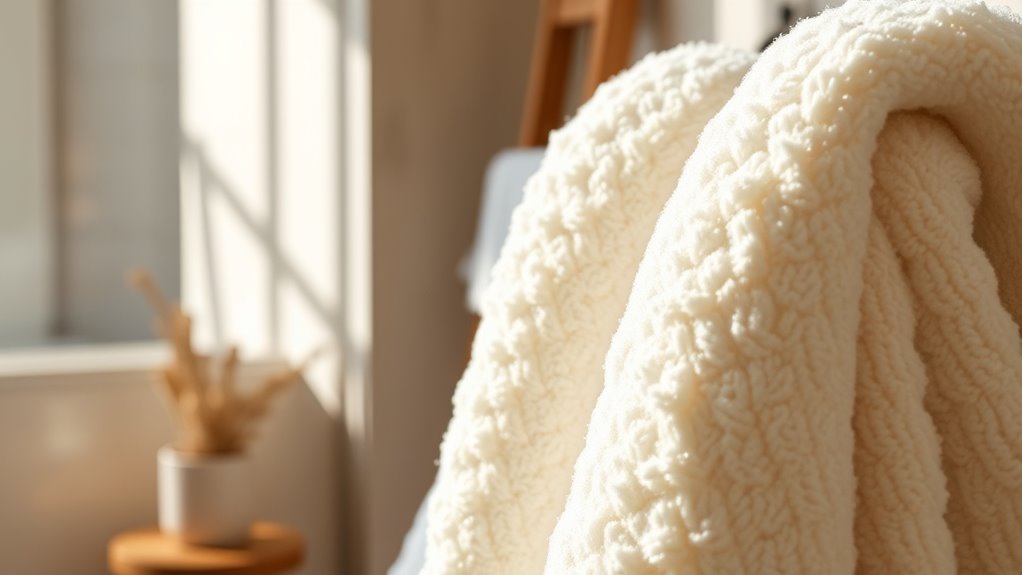To keep your towels fluffy and lasting for years, avoid using fabric softeners and switch to natural cleaning methods like vinegar and baking soda. Wash towels in warm or hot water without overloading your machine, and dry them on low heat. Regularly shake, fold neatly, and store them properly. Following these simple steps guarantees your towels stay soft, absorbent, and durable—if you want to learn more, there are easy tips to extend their life even further.
Key Takeaways
- Regularly clean towels with vinegar and baking soda to remove residues and restore fluffiness.
- Avoid using fabric softeners and dryer sheets, as they stiffen fibers and reduce absorbency.
- Use proper washing techniques: wash in warm water, don’t overload, and choose gentle cycles.
- Dry towels on low to medium heat with dryer balls or tennis balls to boost fluffiness.
- Store towels properly, fold neatly, and replace worn towels to maintain softness and longevity.
Understanding Why Towels Lose Their Plushness
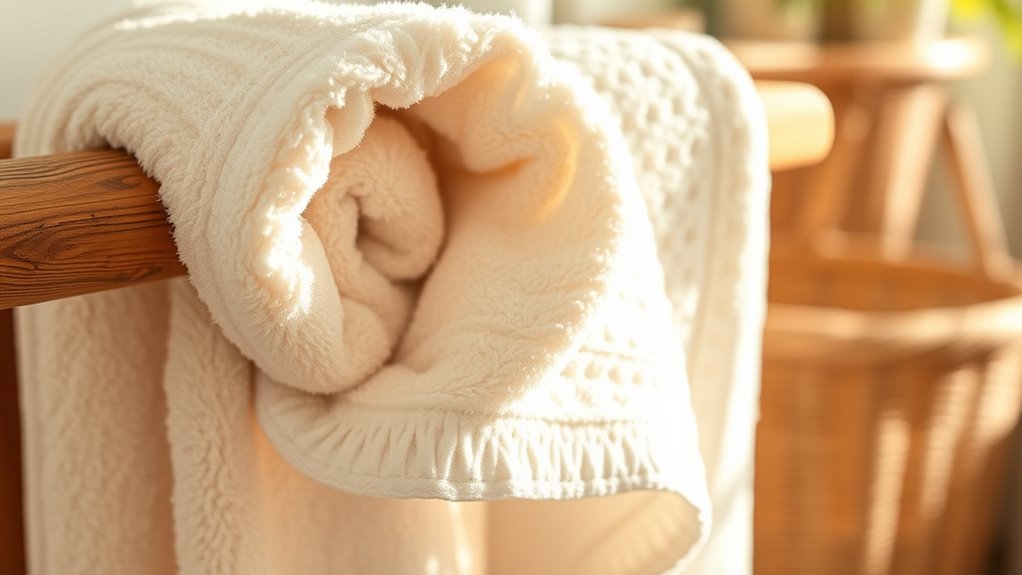
Over time, towels lose their plushness because residues from detergent, fabric softener residues, and mineral deposits from hard water build up on the fibers. This buildup creates a barrier that hampers absorbency and causes fibers to stiffen. Excessive detergent or improper washing techniques can leave behind lint accumulation and debris, dulling towel fibers. High water temperatures or overloading the washer accelerate fiber degradation, weakening the towel’s structure. Over time, these factors cause the fibers to break down, making towels rough and less fluffy. To maintain softness, it’s essential to use appropriate washing techniques, avoid excessive detergents, and consider water temperature. Regularly removing mineral deposits and minimizing fabric softener residues helps preserve the towel fibers, keeping them plush longer. Implementing specialized cleaning methods can further extend the lifespan of your towels and keep them feeling luxurious for years, especially when using proper laundry techniques designed to protect delicate fibers. Additionally, choosing quality towels made from high-grade cotton can significantly help retain their softness over time, and employing gentle washing cycles can prevent unnecessary fiber damage. Paying attention to water quality and using water softeners when needed can also greatly improve towel longevity and plushness.
The Monthly Natural Care Routine for Soft and Fresh Towels
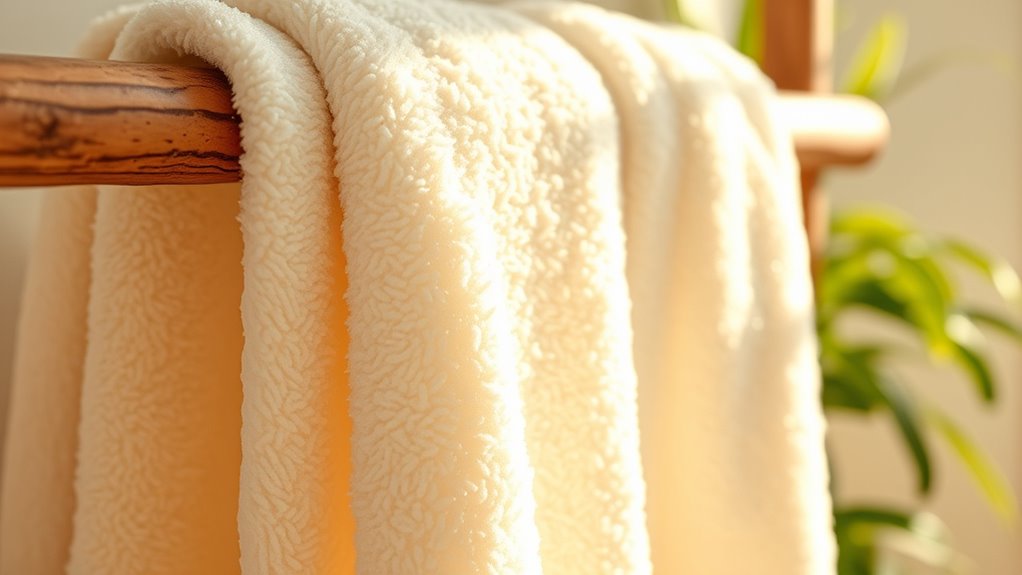
Implementing a monthly natural care routine is a simple yet effective way to keep your towels soft and fresh. Start by washing them with one cup of white vinegar in the first cycle to remove residue and soften the fibers. Skip detergent and fabric softeners during this wash to prevent buildup. Follow with a second wash adding one cup of baking soda directly into the washer to neutralize odors and boost fluffiness. After washing, dry your towels promptly in a tumble dryer on low heat or hang outdoors to maintain their softness and freshness. Regularly performing this routine helps preserve towel quality, prevents stiffness, and extends their lifespan. Additionally, understanding fiber care can help you choose the best methods for maintaining your towels’ plushness over time. Incorporating proper laundry techniques can further enhance their durability and comfort. Proper detergent use is also essential to avoid damaging the fibers and keeping towels feeling plush. Using the right washing temperature can further prevent fiber damage and preserve softness. To further enhance softness, consider using keto-friendly natural ingredients that are gentle and effective.
Step-by-Step Guide to Washing Towels for Maximum Fluffiness
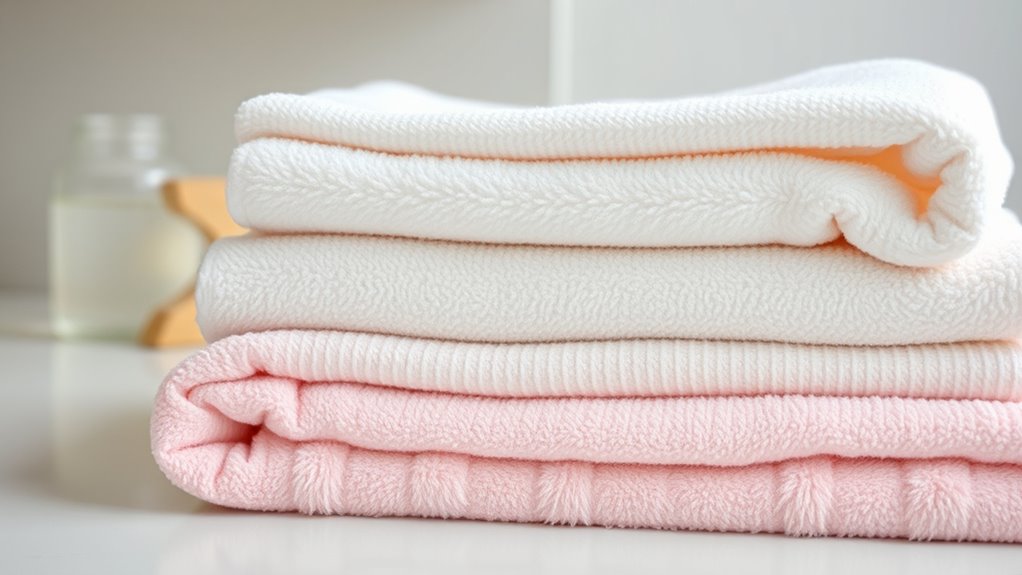
To achieve maximum fluffiness when washing your towels, start by selecting a warm or hot water cycle, which helps break down detergent residues and enhances softness. Use this cycle for white towels to keep them bright and plush. For added softness, run a separate wash with one cup of white vinegar; it removes odors and softens fibers without using detergent. Additionally, vinegar can help preserve towel fibers and extend their lifespan. Incorporating gentle cycle settings can further protect the delicate fibers of your towels, preventing wear over time. Afterward, run a second cycle adding half a cup of baking soda directly onto the towels, which neutralizes smells and boosts fluffiness. Be sure not to overload your washer, so water can circulate properly and each towel gets cleaned thoroughly. To further protect your towels’ long-lasting fluffiness, consider robotics integration in your laundry process, which can optimize washing cycles for efficiency and gentle handling. Once done, promptly dry on medium heat or hang to dry, shaking out towels beforehand to maintain their plush, fluffy texture for years.
Effective Techniques to Remove Odors and Stubborn Stains
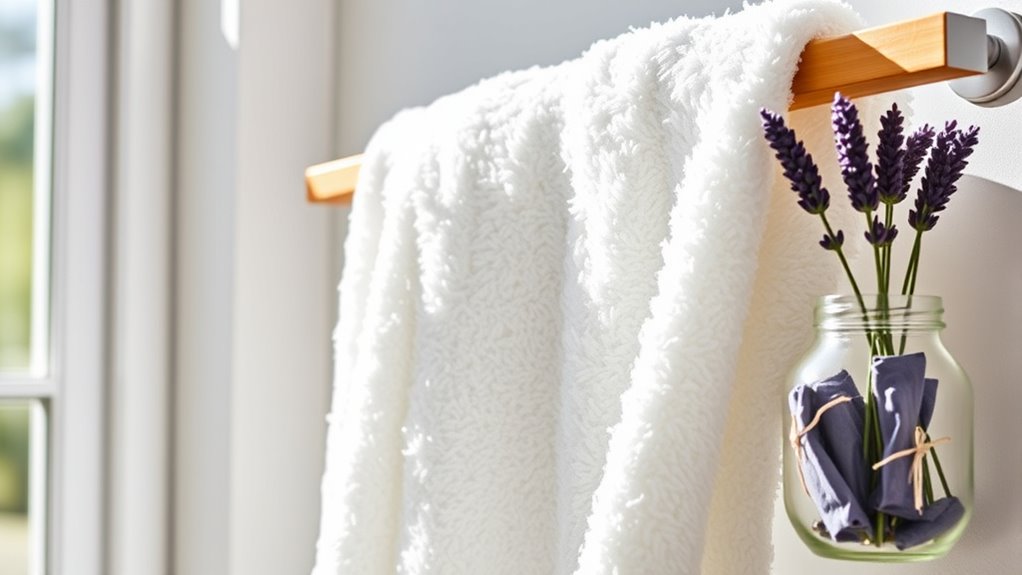
For stubborn stains and lingering odors, soaking your towels in a mixture of white vinegar and water for about three minutes is highly effective. This pre-treatment helps dissolve stubborn stains and neutralizes odors before washing. To maximize results, follow these steps:
- Wash towels in hot water with a cup of white vinegar to enhance odor neutralization and stain removal. Proper installation of your washing machine can also improve cleaning efficiency.
- Re-wash with baking soda added directly into the washer to further neutralize odors and break down residue from previous detergents or stains. Incorporating proper laundry techniques can further optimize cleaning results.
- Air-dry your towels outdoors or on a drying rack, allowing natural UV rays to disinfect and reduce any remaining odors. Additionally, towel maintenance practices like regular washing and proper storage can prolong their fluffiness.
- Incorporating an air purifier in your laundry area can help remove airborne particles and improve overall air quality, helping your towels stay fresher longer. Maintaining proper laundry room ventilation can also contribute to fresher towels.
Using hot water during treatments ensures deep cleaning, and separating vinegar and baking soda cycles avoids harmful reactions. This approach keeps your towels fresh and fluffy for years.
Proper Drying and Folding Methods to Maintain Softness
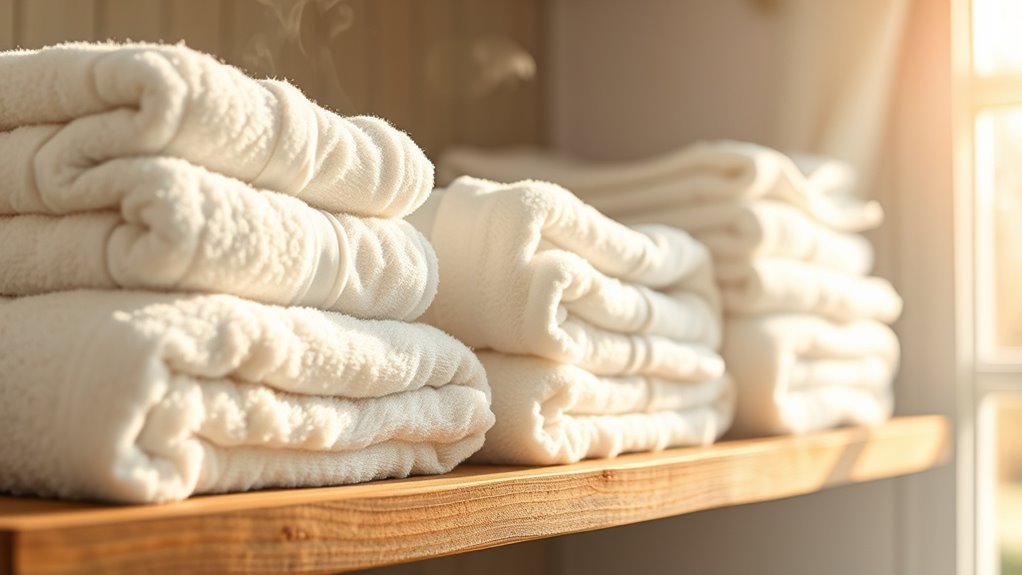
Keeping your towels soft and fluffy depends heavily on how you dry and fold them. To maintain softness, shake towels vigorously before hanging or folding to help fluff fibers. Dry them on low to medium heat in the tumble dryer, as high heat can damage fibers and cause stiffness. Use a tennis ball or dryer ball during tumble drying to gently beat and fluff the fibers. When folding, tuck edges inward and fold in thirds lengthwise to keep towels neat and prevent fiber compression. Guarantee towels are completely dry before storage to avoid mildew and preserve plushness. Proper drying and folding techniques help retain fluff and softness, ensuring your towels stay like new for years. Additionally, choosing the right toilet cleaner can prevent buildup and maintain the towel’s cleanliness and freshness. Incorporating the right antique accents into your bathroom decor can also enhance a cozy, inviting atmosphere that complements fluffy towels. Regularly refreshing your linen closet with clean, dry towels also supports long-term softness and freshness. To further extend the lifespan of your towels, consider checking your projector bulb maintenance to ensure your bathroom is well-lit and inviting. Maintaining proper fiber integrity through gentle handling is essential for lasting softness and durability.
Tips for Extending the Lifespan of Your Towels and Keeping Them Like New
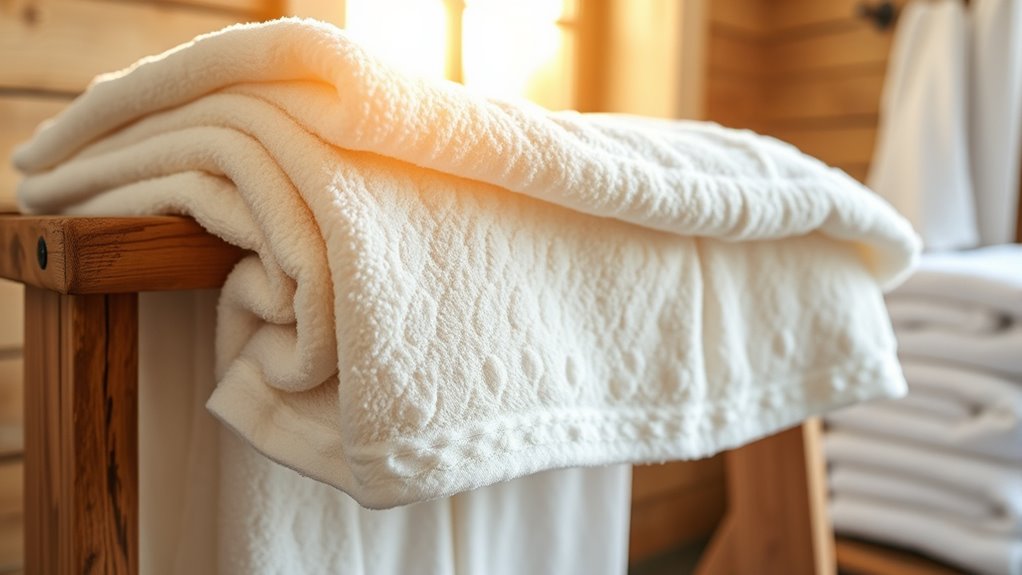
To keep your towels looking and feeling like new, focus on proper washing techniques and regular maintenance. Using vinegar and baking soda helps prevent buildup and preserves softness, while skipping fabric softeners protects the fibers. Consistently following these practices guarantees your towels stay plush and durable over time.
Proper Washing Techniques
Proper washing techniques are essential for maintaining the softness and absorbency of your towels. To do this effectively:
- Use warm or hot water when washing towels, but avoid overloading the washer to ensure proper water circulation and fiber agitation. This helps remove residues and dirt thoroughly.
- Add half a cup of baking soda during the first wash to deodorize and break down buildup. Follow with vinegar in a separate rinse cycle to soften fibers naturally.
- Avoid fabric softeners and dryer sheets, as they leave residues that stiffen fibers and reduce absorbency. Instead, dry towels promptly on low to medium heat and shake them out before drying for added fluffiness.
Regular Maintenance Practices
Regular maintenance is key to extending the lifespan of your towels and keeping them feeling like new. Wash your towels every 1-3 uses with gentle detergents to prevent buildup and preserve softness. Once a month, perform a vinegar and baking soda treatment to remove mineral deposits that can stiffen fibers over time. Avoid fabric softeners and dryer sheets, as they leave chemical residues that diminish plushness. Proper drying methods, like shaking towels before tumble drying on low heat, help maintain their fluffy texture and prevent stiffness. Regular towel maintenance not only prolongs their life but also keeps them absorbent and comfortable. When towels become excessively worn or lose their softness, replacing them guarantees you enjoy fresh, plush towels for years to come.
Frequently Asked Questions
How to Get Super Fluffy Towels?
To get super fluffy towels, start by washing them in warm or hot water with half a cup of baking soda to break down residues. Do a second rinse with a cup of white vinegar to dissolve soap buildup and soften fibers. Avoid fabric softeners, and tumble dry on low or medium heat with a dryer ball or tennis ball to boost fluffiness. Repeat this process monthly for lasting softness.
How Do Hotels Keep Their Towels Soft and Fluffy?
Imagine walking into a hotel and feeling those irresistibly soft towels. You might wonder how they stay so plush. Hotels keep towels soft by washing at high temperatures with minimal detergent, using commercial fabric softeners, and adding an extra rinse to remove residue. They also carefully manage water hardness and replace towels regularly. These steps work together, ensuring your towels stay fluffy and inviting, wash after wash.
How Do You Stop Fluff Coming off New Towels?
To stop fluff coming off new towels, start by washing them separately in warm water with half a cup of vinegar. Avoid fabric softeners during the first few washes, as they can increase fluff shedding. Air dry or use low-heat tumble drying to prevent heat damage. Shake out towels before and after drying, and don’t overload your washing machine to reduce friction, which helps keep fluff at bay.
Does Vinegar Help Keep Towels Fluffy?
So, you wonder if vinegar keeps towels fluffy? Ironically, this simple kitchen staple actually does. By breaking down mineral deposits and detergent residues, vinegar restores towel softness and absorbsency. Just add a cup during the rinse cycle, and it works like magic—eliminating odors and preventing stiff, scratchy towels. Keep using it regularly, and you’ll enjoy plush, fresh towels that stay fluffy for years without commercial softeners.
Why Do Towels Lose Their Fluffiness?
Towels lose their fluffiness because mineral deposits, detergent buildup, and harsh water conditions stiffen the fibers over time. When you wash towels with too much detergent or in hard water, residue accumulates, making them rough and less soft. Additionally, using high heat or over-drying damages the fibers, and fabric softeners can coat them, reducing plushness. To keep towels fluffy, avoid these mistakes and treat them gently.
Conclusion
By understanding why towels lose their plushness, you can keep them soft and fresh for years. Regular care, proper washing, and gentle drying are your secrets—simple steps with lasting results. While neglecting these tips might save time now, it’ll cost softness and durability later. So, invest a little effort today to enjoy fluffy, cozy towels tomorrow. Softness and longevity go hand in hand—your towels’ future depends on how you treat them today.
